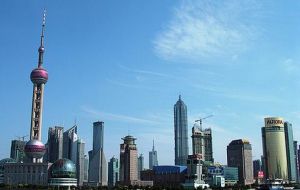MercoPress. South Atlantic News Agency
A wealthy nation made up mostly of poor people overtaking Japan?
 Chinese per capita GDP is a tenth of Japan’s
Chinese per capita GDP is a tenth of Japan’s Where world economy is concerned, August 16, 2010 will go down history as a significant date. On this day, Japan quietly ceded to China the coveted title as the world's second largest economy which it had held for four decades.
China's GDP officially overtook Japan in the second quarter of this year to become the world's second largest.
Sure enough the United States will remain the Big Brother until at least 2025, when it is expected to get dethroned by the Asian giant.
Over the past two decades, China's economy has been expanding at impressive double-digit annual rates compared to the lacklustre Japanese economy hovering at around the 1% level since 1990.
In economics, GDP measures the combined market values of all the products of a country within a specific period of time, and can vaguely reflect the size of that country's economy.
With the Chinese economy now larger than Japan's, it shows that China's economy and national strength have experienced a tremendous lift, as well as signifies a remarkable shift in global economic prowess and influences.
From historical point of view, perhaps many Chinese will take delight in such a shift as if the humiliation suffered during the past century would now be obliterated and taken over by glory and pride.
I would nevertheless choose to look at things from more pragmatic perspectives.
The phenomenal growth of GDP should not just bring a sense of vanity, more importantly it must also lift the living standards of China's billion-strong population.
Of course, it is essential that we strive to get a better understanding of the true significance of GDP growth instead of getting carried away by the superficial number game.
China's GDP has been established upon the productivity of some 1.3 billion people. If we divide that figure by 1.3 billion, all we get is the per capita GDP, which is short of a tenth of Japan's and ranked beyond 100 in the world.
We can see from this angle that even as China is a wealthy nation, it is made up of mostly poor people. Moreover, a second ranking in GDP does not denote that China is now the world's second most powerful nation.
As a matter of fact, China's economy is still very much at the bottom of the economic chain, relying largely on an abundance of inexpensive labor to churn out a multitude of low-cost products. Such a growth model may not be sustained, and often achieved at the expense of the environment and quality of life.
In the latest issue of Newsweek, China has been ranked 59 among a hundred odd countries in the world based on hygiene, economic vibrancy, education, political environment and quality of life.
China is still poorly ranked in terms of political openness and quality of life, not something a real global power should boast.
Small countries such as Finland, Switzerland, Sweden and Australia, on the other hand, enjoy very high per capita incomes and excellent quality of life despite their relatively small GDP. This is what we should really explore.
By Tay Tian Yan - Sin Chew Daily - Chine




Top Comments
Disclaimer & comment rules-

-

-

Read all commentsChina´s rise poses some serious challenges to the world.
Aug 20th, 2010 - 03:29 am 01. It is not a democracy, but a totalitarian, militarized regime with nuclear weapons.
2. It´s growth is based on cheap labor, on denying its hundreds of millions of workers basic freedoms like free and independent labor unions, etc.
3. China maintains its currency artificially undervalued in order to make goods manufactured in china more competitive than in other countries.
4. China maintains the US Dollar artifically overvalued by acquiring massive amounts of dollars every day.
“Small countries such as Finland, Switzerland, Sweden and Australia, on the other hand, enjoy very high per capita incomes and excellent quality of life despite their relatively small GDP. This is what we should really explore.”
Aug 20th, 2010 - 03:50 am 0Yes, it's worth to explore those nations, but I can tell you (experienced in Holland, similar as Finland, but better)...do not copy their socialist welfare schemes that will eventually break them when there are more old people collecting their inflated pensions, less young, who are fed up paying more and more taxes and getting less in return.
Please bear in mind that whilst China may be the second largest economy, China itself says that it is nowhere near the second largest economic power. The Chinese know they have a long way to go.
Aug 20th, 2010 - 04:55 pm 0Commenting for this story is now closed.
If you have a Facebook account, become a fan and comment on our Facebook Page!